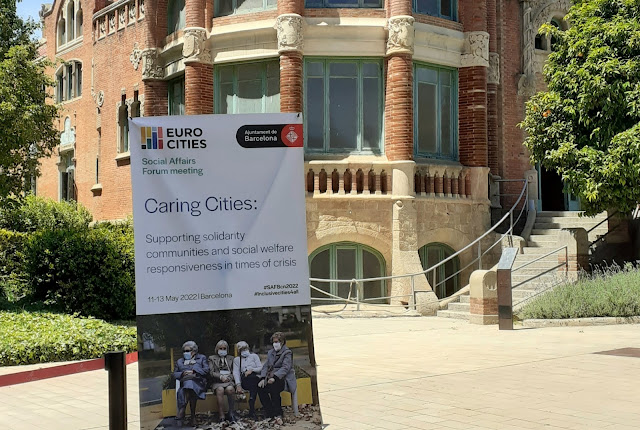Caring Cities (English)
Throughout Europe, the pandemic and other global crises, such as wars and the devastating impacts of climate change, have put the well-being of children and young people to the test. Too many people have lost faith in the future, and it has become an essential task for us adults to support young people's optimism and strength to push forward. The Eurocities Social Affairs Forum held in Barcelona in May this year showed encouraging examples of commitment across Europe to improve the well-being of children and young people.
While governments operate at a state level, cities as actors come closer to people. "Cities know from experience that dismantling inequality and supporting inclusion strengthen security, while a regime that shuts people out creates inequalities and problems," said Senior Research Fellow Blanca Garcés-Mascareña describing the unique role of cities in bettering society. In Helsinki the city’s Social Services and Health Care Division plays a particular part in preventing segregation and promoting the health and well-being of children and young people. According to UNICEF leader Philippe Cor, the best antidote to future conflicts is children who feel valued.
In the spring of 2022, representatives of the City of Helsinki's Social Services and Health Care Division enthusiastically joined the Children and Young People working group meeting of the Eurocities network's Social Affairs Forum in Barcelona. During the pandemic, the working group met remotely, but in May it was finally possible to travel and get together face-to-face.
 |
| Poster for the Eurocities Social Affairs Forum held in Barcelona |
The days included formal presentations, panel discussions, and opportunities for more informal discussions with other attendees. We were informed of how the war in Ukraine has affected Warsaw, which has received large numbers of refugees since the beginning of Russia's invasion. Despite the heavy topic, the strong desire and energy to help portrayed by the city and its residents also inspired hope among the attendees. Solidarity with all refugees was one of the main themes of the Forum.
Sant Pau Recinte Modernista and its sunny yard with orange trees and parrots provided an ideal setting for networking, which is crucial to internationalisation. At their best, networks and international interaction function as platforms for innovative ideas and development, creating solutions that actors alone would not be able to produce. A common and strong focus was also based on EU lobbying. By networking with other European-level actors in the Social Affairs Forum and engaging in joint advocacy work, it is easier to influence EU decision-making at an international level.
 |
| Sant Pau Recinte Modernista, Barcelona |
We visited the Barcelona LGBTI Centre and familiarised ourselves with the city's anti-discrimination work. We also watched a film together and considered how to respond to the ageing population in the EU and the need to change health care and care systems for the elderly. Stella van Voorst's documentary Good Neighbours (2018) painted a moving picture of the loneliness of the elderly. The discussion that followed the film focused on the role of family members, the possibilities of voluntary work, and the responsibilities of the public service system. The importance of harmonising these roles and responsibilities as the need for services grows, was underlined.
The last day of the trip was reserved for teamwork. During the workshop in the morning, we considered the importance of effective early childhood education and examples of good practices from all over Europe. Our discussions made it clear that high-quality early childhood education and care play a key role in promoting the equality and well-being of children and support the employment of parents.
The afternoon’s Children and Young People working group meeting focused on the inclusion of children and young people and the situation of children who have fled Ukraine. We heard about the work done in Barcelona to promote the inclusion of children. Representatives from Milan also shared how they have succeeded in strengthening the involvement of children and young people by targeted measures such as working with children and young people in football fields. Although Finland has collected a lot of feedback and information directly from children and young people, we could learn from how children and young people have been involved in collecting and processing this type of important data elsewhere. The group will focus its work on mental health issues in the future, which we consider exceptionally important. After the Forum, all attendees agreed that the value of our work and the important role of Helsinki’s Social Services and Health Care Division in shaping a better environment for our children was highlighted on our trip to Barcelona. The opportunity for attendees to learn from one another and share knowledge was considered a valued experience. It was also important to increase our competence in the matters at hand and also of course, promote the international visibility of the Division itself.
 |
| A work plan presented at the Children and Young People working group meeting |
Text:
Outi Forsström, Senior Planning Officer, Human Resources and Development Services
Johanna Sirén Päivärinta, Senior Social Worker, Family and Social Services
Silja Remes, Senior Social Worker, Family and Social Services
Photos: Silja Remes
Kommentit
Lähetä kommentti